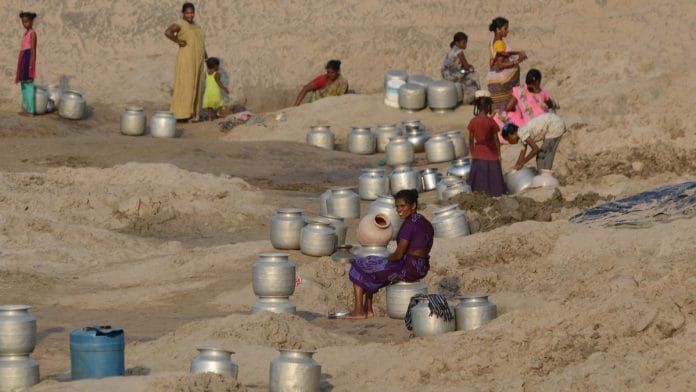The Challenge Of Water
Amitabh Kant | CEO, Niti Aayog
The Times of India
Amitabh Kant says India is staring at a big water challenge and outlines a series of steps through which the country can overcome this problem.
First, he says we need to conserve our existing local water bodies. For example, rivers, ponds and lakes in the panchayats. Second, he says we need to use advanced technology, such as geo-tagging water resources, to continuously monitor their levels. Third, we should focus on community management of water resources. Fourth, he says, we need to improve our farm-water efficiency which is among the lowest in the world.
He also says that our legal framework, which combines water rights with land rights allowing landowners to extract groundwater continuously, needs to be reformed.
Courts must employ stricter scrutiny
Gautam Bhatia | Advocate, Supreme Court
Hindustan Times
Gautam Bhatia argues that the recent Bombay High Court judgement which upholds the constitutional validity of death penalty for repeat offenders in cases of rape represents a failed opportunity. The court had a chance to scrutinise a recent trend where death penalty is being awarded in an increasing number of cases.
He says that the Supreme Court has made it clear that death penalty is to be awarded in only the “rarest of rare cases” as a death sentence is “final”. It is possible for errors to happen during the legal process and while those errors can be rectified in other cases through compensation they cannot be done if a person is dead.
The death penalty, thus, “presents a unique kind of threat to individual rights,” he says.
The new idea of India
Makarand R. Paranjape | Director, Indian Institute of Advanced Study, Shimla
The Indian Express
Makarand Paranjape talks about the concept of “Bharat Shakti” developed by Aurobindo. He had says: “India is the Bharata Shakti, the living energy of a great spiritual conception, and fidelity to it is the very principle of her existence”. Paranjape argues that in PM Narendra Modi, India has finally found a leader who understands this concept and is determined to take the country to greater heights.
He also says that India’s hard power coupled with its Soumya Shakti, the soft power of its culture, has rejuvenated the country.
Farmer focus is farming focus
Naveen P Singh and Ranjith PC | Writers are with Indian Council of Agricultural Research and National Institute of Agricultural Economics & Policy Research
The Economic Times
The annual Budget outlay has increased by about 144 per cent since 1947 till the interim Budget in February but the status of Indian farmers hasn’t improved considerably, writes Singh and Ranjith. Plans are yet to be delivered at the grassroots level. Food adequacy and nutritional security at the farm household level continue to remain tricky areas for planners. The support price regime and Agriculture Produce Market Committee (APMC) are limited to certain crops, farmers and regions. The number of Farmer Producer Organisations (FPOs) must be increased to give bargaining power to farmers. The piecemeal approach of income-support scheme in Budgets do not help increase income of farmers or improve their living standards. Besides, it does not offer anything to the youth to be retained in agriculture. More than plans and announcements, pragmatice steps are key to address this problem.
The right price of water
Dhiraj Nayyar | Chief economist, Vedanta Ltd
Business Standard
Water will be priority for the Modi government. The only way to ensure efficient usage of water is by fixing an appropriate price for water and the consequences of not making it chargeable can have serious effects. Apart from farmers, even industry and individual consumers must be charged for water. Nayyar, in his column, prescribes framing incentives and penalties for water usage. There will be objection to pricing water since it will hurt the poor but its shortage will have a more severe impact on them. There will be challenges in making water chargeable and governments will be tempted to subsidise it. “It is the government’s right to subsidise but it must not do so by distorting the market but through direct benefit transfers to a targeted set,” he writes.
Towards a more equitable and inclusive education system
Anurag Behar | CEO of Azim Premji Foundation
Mint
Copies of the draft National Education Policy have been burnt by protestors, who claimed that it has been written by corporates and for corporates. Behar says that some of these reactions are on “known partisan lines, yet puzzling,” which is not entirely case, though there are constructive critiques too. The NEP focuses on equity than quality. “This is not because quality is not as important. But because all educational history tells us that quality follows equity, but equity doesn’t necessarily follow quality,” he says. The proposed autonomous National Research Foundation (NRF), will develop and support a vibrant research ecosystem. It will also develop capacity, foster culture besides funding projects through a rigorous peer-review process. This will bring about a research revolution across institutions (including state universities), and not just in a few “islands of excellence”.






